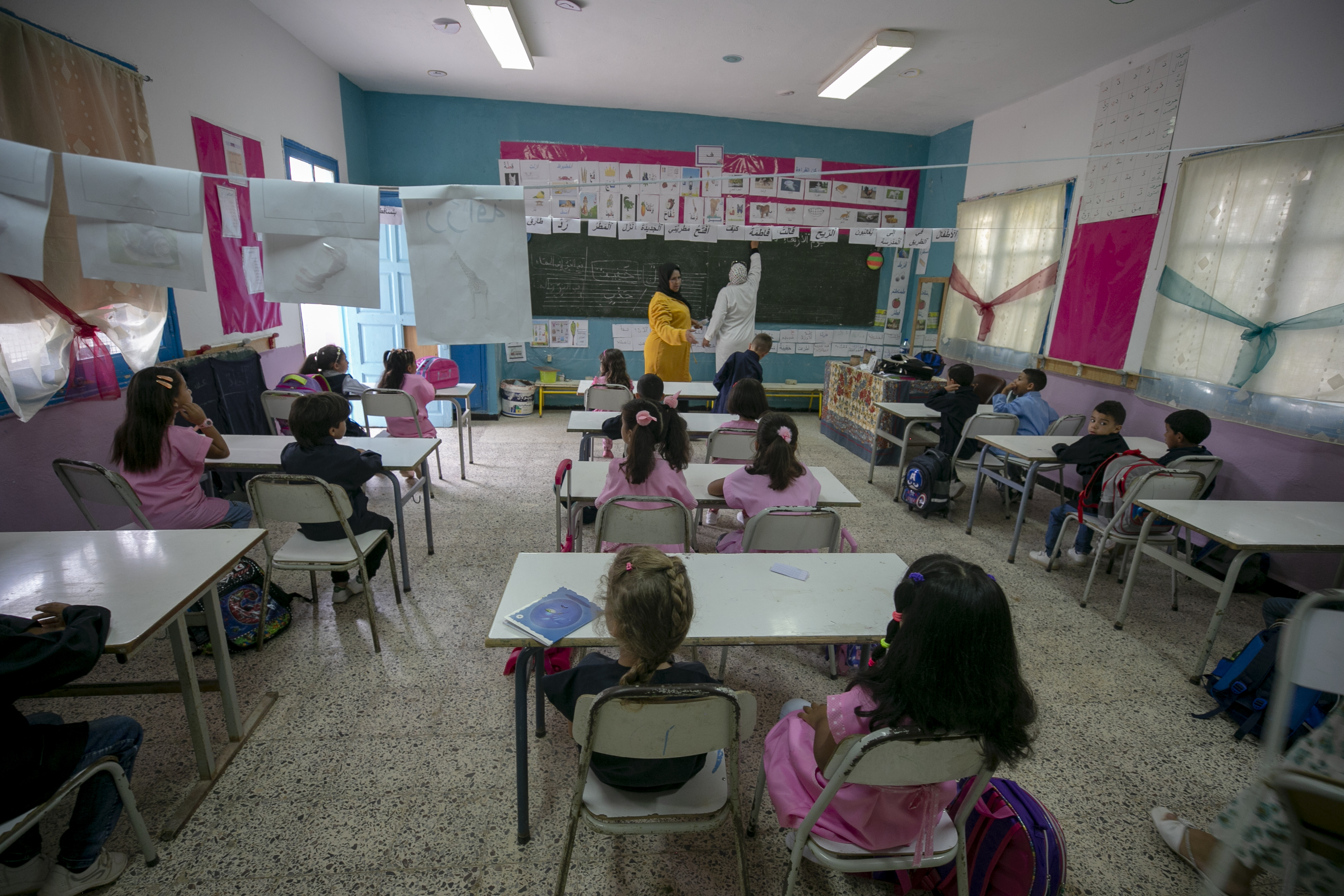The Middle East Institute's (MEI) North Africa and Sahel Program and the North African Policy Initiative (NAPI) are excited to announce a six-part roundtable series through which Tunisian youth will examine key policy issues affecting their country. The series will consist of livestreamed discussions. Each roundtable will allow engaged Tunisian youth to present their observations and perspective on the policy issue as it presents itself in Tunisia. The inaugural roundtable will highlight education challenges and opportunities.
In 2021, a region-wide poll found that 77% of respondents were dissatisfied with education - more than in any other country in North Africa, and for a reason. In the years following Tunisia’s independence in 1956, large investments in, and reform of education made it an asset that distinguished the country from others in the region and granted a real opportunity for social promotion. Nowadays, after years of neglect and an unordered development of private education that followed the 2011 revolution, education has largely become a liability and a mechanism that institutionalizes social inequality. Nowadays, education represents an increasing cost for families that can afford it, and a decreasing value for those who cannot. How did we get here? During this policy-oriented roundtable discussion, engaged Tunisian youth will provide their perspective, and will shed light on challenges and opportunities related to education in Tunisia.
Speakers:
Nourjahen Gala-Ali
Nourjahen (she/her) is a project manager for Lights, Camera, Learn!, an NGO that works with kids in underserved regions in different countries around the world to create fun and educational content through filmmaking. She is also an educational consultant for Highway International, advising students on academic and career orientation. For the last few years, Nourjahen has worked on non-traditional forms of education and its different aspects, working and volunteering in the U.S., Germany, Tunisia, and Algeria. She has a English Studies license degree from the Higher Institute of Languages in Nabeul and is the recipient of the Thomas Jefferson Scholarship Program.
Mehdi Cherif
Mehdi is currently pursuing a master's degree in sociology at the Faculty of Humanities and Social Sciences in Tunis, after a bachelor's degree in sociology at the same institution as well as a BSc in Social Psychology at the Open University (UK). He is the author of two books about the reform of Tunisian education: Réflexions d'un Elève Insoumis (2017), and Ils sont parmi nous : GERM et Education en Tunisie (2019). His main areas of interest are educational policy, the power dynamics underlying education, popular and non-formal education, and the relationship between education and employment. He is the co-founder and current coordinator of Fahmologia, a non-profit initiative to promote scientific communication in Tunisia.
Mariem Bchir
Mariem is a Software engineer focused on building Technological solutions to challenges faced within the education sector. For the past 7 years, Mariem conducted research on teacher education in Taiwan, South Korea, Japan, Brazil, Finland, the United States, and Nepal. She has worked across four continents developing entrepreneurial studies curricula, evaluating and redesigning course content and delivery, and analyzing data. Mariem holds a master's degree in Global Affairs from Tsinghua University, and a bachelor's degree in Computer Science and Educational Studies from Davidson College. She is the co-founder of LEAPS Academy, a teacher training start-up based in Tunisia.
Walid Hedidar
Walid Hedidar is an education development specialist, currently working in the strategic philanthropy and social impact space. Since 2015, Walid has led several initiatives to improve education outcomes in Tunisia. He has previously worked for the Brookings Institution in Washington D.C., the Ministry of Education in France, UNDP in Tunisia, and UNESCO's International Institute of Educational Planning in Senegal. Walid holds a master's degree in International Educational Development from the University of Pennsylvania and a bachelor's degree in International Affairs from the University of Denver. In his free time, he co-runs LEAPS Academy, a teacher-training startup based in Tunisia.
Jean-Louis Romanet Perroux, moderator
Jean-Louis is a researcher and advisor on international cooperation and development, and the director of the North African Policy Initiative. He has over 20 years of hands-on experience in program design and implementation, in training and coaching students and activists, and in conducting action-oriented research and strategic evaluations in the fields of civil society, youth empowerment, local governance, corruption, human trafficking and smuggling, migration, and the prevention of violent extremism. He has obtained a Bachelor in Aeronautical Engineering from the Italian Air Force Academy, a Master in Political Science from the University of Trieste and a Master and a PhD in International Relations from the Fletcher School of Law and Diplomacy, Tufts University.
Intissar Fakir, co-host
Intissar is a senior fellow and director of MEI’s North Africa and Sahel program. She is an expert on North Africa, the Sahel, and key regional thematic issues including governance, social change, migration, and security. She has written extensively on North Africa’s evolving politics including Islamist electoral politics in post-2011 Morocco and Tunisia, the Western Sahara issue, foreign policy priorities in Morocco and the broader region, and the impact of COVID-19 on regional political stability. Her research has also included political transitions, mobilization trends, energy, and social change in Morocco, Mauritania, Algeria, and Tunisia.

This event is part of a series held in partnership with the North African Policy Initiative (NAPI)
Photo by Anadolu Agency via Getty Images












